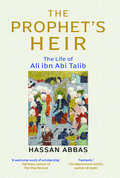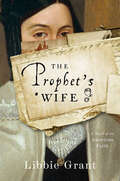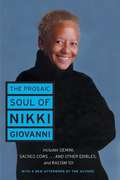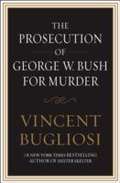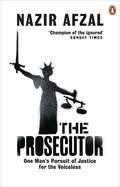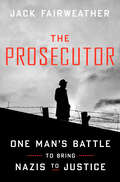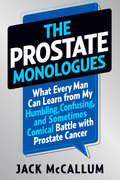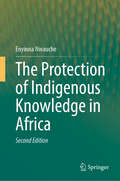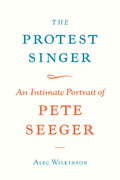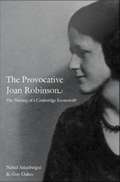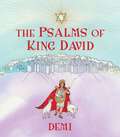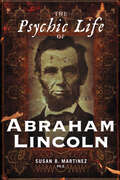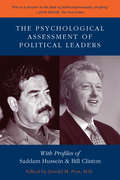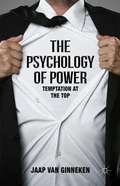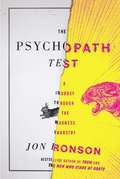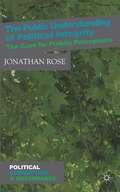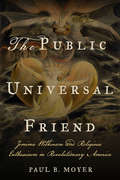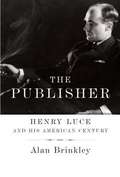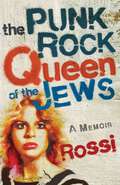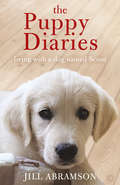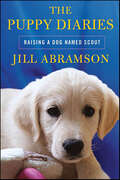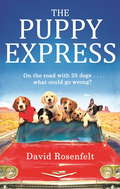- Table View
- List View
The Prophet's Heir: The Life of Ali ibn Abi Talib
by Hassan AbbasThe life and legacy of one of Mohammad&’s closest confidants and Islam&’s patron saint: Ali ibn Abi Talib Ali ibn Abi Talib is arguably the single most important spiritual and intellectual authority in Islam after prophet Mohammad. Through his teachings and leadership as fourth caliph, Ali nourished Islam. But Muslims are divided on whether he was supposed to be Mohammad&’s political successor—and he continues to be a polarizing figure in Islamic history. Hassan Abbas provides a nuanced, compelling portrait of this towering yet divisive figure and the origins of sectarian division within Islam. Abbas reveals how, after Mohammad, Ali assumed the spiritual mantle of Islam to spearhead the movement that the prophet had led. While Ali&’s teachings about wisdom, justice, and selflessness continue to be cherished by both Shia and Sunni Muslims, his pluralist ideas have been buried under sectarian agendas and power politics. Today, Abbas argues, Ali&’s legacy and message stands against that of ISIS, Al-Qaeda, and Taliban.
The Prophet's Wife: A Novel of an American Faith
by Libbie GrantA sweeping, lyrical tale of historical fiction that tells the unbelievable story of the early days of the Mormon church through the eyes of the woman who saw it all—Emma, the first wife of the prophet Joseph Smith.In 1825, in rural Pennsylvania, Emma Hale marries an itinerant treasure-digger, a man who has nothing but a peep-stone in his pocket and a conviction that he can speak directly to God. His name is Joseph Smith and in a few short years, he will found his own religion, gather zealous adherents by the tens of thousands, and fracture Emma’s life and faith While the Mormon religion finds its feet and runs beyond the grasp of its founder, Emma struggles to maintain her place in Joseph’s heart—and in the religion that has become her world. The Mormons make themselves outcasts everywhere they go. Joseph can only maintain his authority by issuing ever-stranger commandments on God’s behalf, culminating in an edict that men should marry as many women as they please. The Mormons’ adoption of polygamy only sets them further apart, and soon their communities are ravaged by violence at the hands of their outraged fellow Americans. For Emma, things take a more personal toll as Joseph brings in a new wife—a woman whom Emma considers a sister.As Emma’s family grows along with Joseph’s infamy, she knows there will never be peace until Joseph faces the law. But on the half-wild edge of the frontier, he’s more likely to find death at the hands of a vigilante posse than a fair trial. For the sake of her people—and her soul—Emma must convince the Prophet of God to surrender... and perhaps to sacrifice his life.
The Prophets
by Abraham J. HeschelThis book is about some of the most disturbing people who have ever lived: the men whose inspiration brought the Bible into being--the men whose image is our refuge in distress, and whose voice and vision sustain our faith.
The Prosaic Soul of Nikki Giovanni (Perennial Classics Ser.)
by Nikki GiovanniThis omnibus edition collects celebrated poet and activist Nikki Giovanni’s adult prose: Racism 101, Sacred Cows and Other Edibles and seven (7) selections from Gemini: An Extended Autobiographical Statement on My First Twenty-Five Years of Being a Black Poet, which was nominated for the National Book Award in 1971. Racism 101 (1994) contains essays that indict higher education for the inequities it perpetuates and contemplates the legacy of the 1960s. Giovanni gives searing commentary on Spike Lee and the making of Malcolm X, W.E.B. DuBois, affirmative action, President JFK and the state of urban schools. Racism 101 adds an important chapter to the debate on American national values. Sacred Cows and Other Edibles (1988) received the Ohioana Library Award. In it Nikki’s esays and articles take on the loftiness of higher education and personal major life crises. In Gemini (1971), Giovanni explores one of the most tumultuous periods in our history. Her essays take us from her childhood in Knoxville, Tennessee, through her work in the Black revolution of the sixties, to her emergence as an acclaimed poet. Nikki interweaves warm recollections of her personal history with incisive vignettes of cultural and political history, including her often surprising opinions of Amiri Baraka, Angela Davis, Lena Horne, Stokely Carmichael, H. Rap Brown and others.
The Prosecution of George W. Bush for Murder
by Vincent T. BugliosiBugliosi sets forth the legal architecture and incontrovertible evidence that President Bush took this nation to war in Iraq under false pretenses - a war that has not only caused the deaths of American soldiers but also over 100,000 innocent Iraqi men, women, and children; cost the United States over one trillion dollars thus far with no end in sight; and alienated many American allies in the Western world.
The Prosecutor
by Nazir AfzalThe outsider who transformed our justice systemNazir Afzal knows a thing or two about justice. As a Chief Prosecutor, it was his job to make sure the most complex, violent and harrowing crimes made it to court, and that their perpetrators were convicted. From the Rochdale sex ring to the earliest prosecutions for honour killing and modern slavery, Nazir was at the forefront of the British legal system for decades.But his story begins in Birmingham, in the sixties, as a young boy facing racist violence and the tragic death of a young family member - and it's this that sets him on the path to his groundbreaking career, and which enables him to help communities that the conventional justice system ignores, giving a voice to the voiceless.A memoir of struggle and survival as well as crime and punishment, The Prosecutor is both a searing insight into the justice system and a powerful story of one man's pursuit of the truth.
The Prosecutor: One Man's Battle to Bring Nazis to Justice
by Jack FairweatherFrom the #1 Sunday Times bestselling author of The Volunteer, the powerful true story of a Jewish lawyer who returned to Germany after World War II to prosecute war crimes, only to find himself pitted against a nation determined to bury the past.At the end of the Nuremberg trial in 1946, some of the greatest war criminals in history were sentenced to death, but hundreds of thousands of Nazi murderers and collaborators remained at large. The Allies were ready to overlook their pasts as the Cold War began, and the horrors of the Holocaust were in danger of being forgotten.In The Prosecutor, Jack Fairweather brings to life the remarkable story of Fritz Bauer, a gay, Jewish judge from Stuttgart who survived the Nazis and made it his mission to force his countrymen to confront their complicity in the genocide. In this deeply researched book, Fairweather draws on unpublished family papers, newly declassified German records, and exclusive interviews to immerse readers in the shadowy, unfamiliar world of postwar West Germany where those who implemented genocide run the country, the CIA is funding Hitler&’s former spy-ring in the east, and Nazi-era anti-gay laws are strictly enforced. But once Bauer landed on the trail of Adolf Eichmann, he wouldn&’t be intimidated. His journey took him deep into the dark heart of West Germany, where his fight for justice would set him against his own government and a network of former Nazis and spies bent on silencing him.In a time when the history of the Holocaust is taken for granted, The Prosecutor reveals the courtroom battles that were fought to establish its legacy and the personal cost of speaking out. The result is a searing portrait of a nation emerging from the ruins of fascism and one man&’s courage in forcing his people—and the world—to face the truth.
The Prostate Monologues: What Every Man Can Learn from My Humbling, Confusing, and Sometimes Comical Batt le With Prostate Cancer
by Jack McCallumRecently diagnosed with prostate cancer and approaching surgery, Jack McCallum wanted to tackle the confusion, misconceptions, and conflicting medical advice that so many men struggle with when thinking about the disease. So he got to work writing The Prostate Monologues.Through the lens of his own experience, McCallum attacks the nitty-gritty questions about prostate cancer that men think about (but may be too bashful to ask their doctors) with honesty and humor. For example, "When is it safe to attempt intercourse, or at least, self-inflicted orgasm?" Or, if you have surgery, "What's it like the first time you shop for adult diapers?" With wry humor, McCallum decodes the sometimes-confusing jargon of medical professionals so that it is understandable and relatable to "regular" men. Prostate cancer is the second most common cancer among men and the second most fatal. Worse than the obvious commonality and mortality of the disease, though, is the fact that prostate cancer can rob a man of his manhood. Accordingly, McCallum handles the subject not only with care and knowledge, but also with good cheer. Through the honest telling of his own story, and drawing on the latest research, McCallum shares insight into what's worked for him—and what's proven to work—in surviving cancer with your sense of humor intact.
The Protection of Indigenous Knowledge in Africa
by Enyinna NwaucheThis book provides a comprehensive contemporary and timely account of the protection of indigenous knowledge in Africa by examining issues such as the nature of indigenous knowledge as part of indigenous property and as the fulcrum of indigenous communities in Africa. Acknowledging the centrality of the members of communities of origin in the production and reproduction of indigenous knowledge, this book discusses options to manage the tension between members of the community, communities of origin and their political community. Furthermore, the book abandons the conceptual distinction between ‘negative’ and ‘positive’ protection and turns towards a subject consideration of indigenous Scientific and Technical Indigenous Knowledge (STIK); indigenous heritage; indigenous designs; indigenous music; indigenous audio-visual, indigenous signs expressions and terms as well as the indigenous literary works that are examined within the context of case studies of the indigenous knowledge human and peoples’ rights. The book concludes that Africa’s modest record of the protection of indigenous knowledge must factor in its extensive use as the foundation of Africa’s entertainment industry and recommends a tripod of ‘community’ ‘participation’ and ‘reward as principles of effective protection. Building on the 2017 title of ‘The Protection of Traditional Cultural Expressions in Africa” this book adopts a mixed method of a legal pluralistic account of indigenous knowledge; using intellectual property as a lens to view indigenous knowledge and a cultural production account of indigenous knowledge and will be useful to intellectual property lawyers; sociologists; economists; Africanists; innovation law and policy specialists and legal practitioners.
The Protest Singer: An Intimate Portrait of Pete Seeger
by Alec WilkinsonA spirited and intimate look at American icon and activist Pete Seeger. Throughout his life, Pete Seeger transformed a classic American musical style into a form of peaceful protest against war, segregation, and nuclear weapons. Drawing on his extensive talks with Seeger, Alec Wilkinson delivers a first hand look at Seeger's unique blend of independence and commitment, charm, courage, energy, and belief in human equality and American democracy. We see Seeger as a child, instilled with a love of music by his parents; as a teenager, hearing real folk music for the first time; as a young adult, singing with Woody Guthrie. And finally, Seeger the man marching with the Rev. Martin Luther King in Selma, standing up to McCarthyism, and fighting for his beloved Hudson River. The gigantic life captured in this slender volume is truly an American anthem.
The Provocativo Joan Robinson: The Making of a Cambridge Economist
by Nahid Aslanbeigui Guy OakesOne of the most original and prolific economists of the twentieth century, Joan Robinson (1903-83) is widely regarded as the most important woman in the history of economic thought. Robinson studied economics at Cambridge University, where she made a career that lasted some fifty years. She was an unlikely candidate for success at Cambridge. A young woman in 1930 in a university dominated by men, she succeeded despite not having a remarkable academic record, a college fellowship, significant publications, or a powerful patron. In The Provocative Joan Robinson, Nahid Aslanbeigui and Guy Oakes trace the strategies and tactics Robinson used to create her professional identity as a Cambridge economist in the 1930s, examining how she recruited mentors and advocates, carefully defined her objectives, and deftly pursued and exploited opportunities. Aslanbeigui and Oakes demonstrate that Robinson's professional identity was thoroughly embedded in a local scientific culture in which the Cambridge economists A. C. Pigou, John Maynard Keynes, Dennis Robertson, Piero Sraffa, Richard Kahn (Robinson's closest friend on the Cambridge faculty), and her husband Austin Robinson were important figures. Although the economists Joan Robinson most admired--Pigou, Keynes, and their mentor Alfred Marshall--had discovered ideas of singular greatness, she was convinced that each had failed to grasp the essential theoretical significance of his own work. She made it her mission to recast their work both to illuminate their major contributions and to redefine a Cambridge tradition of economic thought. Based on the extensive correspondence of Robinson and her colleagues, The Provocative Joan Robinson is the story of a remarkable woman, the intellectual and social world of a legendary group of economists, and the interplay between ideas, ambitions, and disciplinary communities.
The Psalms of King David
by DemiThe Bible tells us that King David was a man after God&’s own heart (1 Samuel 13:14), chosen by Him to lead his people Israel. David began life as a simple shepherd, but his fearless courage and unshakeable faith in God would see him slay the Philistine giant Goliath and become a celebrated warrior. After the death of King Saul, the Lord God would establish David as king over Israel. Soon, he would go on to conquer the fortress city of Jerusalem and install the Ark of the Covenant within its walls. But, above all, King David would be remembered as the inspired poet and harpist who composed the Biblical Psalms to the Lord his God. Award-winning author, Demi, recounts the dramatic story of David, the shepherd who rose to become king.
The Psychic Life of Abraham Lincoln
by Susan B. MartinezThroughout his life, Lincoln consulted oracles; at age 22, he was told by a seer that he would become president of the United States. In his dreams, he foresaw his own sudden death. Trauma and heartbreak opened the psychic door for this president, whose precognitive dreams, evil omens, and trance-like states are carefully documented in this bold and poignant chronicle of tragic beginnings, White House séances, and paranormal eruptions of the Civil War era. Aided by the deathbed memoir of his favorite medium, Lincoln's remarkable psychic experiences comes to life with communications from beyond, ESP, true and false prophecies, and thumbnail sketches of the most influential spiritualists in his orbit. Surveying clairvoyant incidents in Lincoln's life from cradle to grave, the book also examines the Emancipation Proclamation and the unseen powers that moved pen to hand for its historic signing.
The Psychological Assessment of Political Leaders: With Profiles of Saddam Hussein and Bill Clinton
by Post Jerrold M.In an age when world affairs are powerfully driven by personality, politics require an understanding of what motivates political leaders such as Hussein, Bush, Blair, and bin Laden. Through exacting case studies and the careful sifting of evidence, Jerrold Post and his team of contributors lay out an effective system of at-a-distance evaluation. Observations from political psychology, psycholinguistics and a range of other disciplines join forces to produce comprehensive political and psychological profiles, and a deeper understanding of the volatile influences of personality on global affairs. Even in this age of free-flowing global information, capital, and people, sovereign states and boundaries remain the hallmark of the international order -- a fact which is especially clear from the events of September 11th and the War on Terrorism.
The Psychology of Politicians
by Ashley WeinbergThe Psychology of Politicians explores a topic which fuels public and media debate yet is under-researched and has potentially far-reaching consequences for the success of our political systems. Focusing on research with democratically elected representatives from the UK, Poland and Italy, and on the political behaviour of a former US President and voters' perceptions in the emerging democracy of Ukraine, this book is packed with psychological insights. Using quantitative and qualitative methodologies, the contributors chart the progress of the individual politician from selection as a candidate to becoming established in Parliament examining their qualities as communicators, thinkers and leaders. The impact of work and non-work pressures on their mental well-being and capacity to handle a crisis are probed and the roles of personality traits in politicians' values and in public perceptions of our elected representatives are highlighted.
The Psychology of Power
by Jaap Van GinnekenThe author tests the hypothesis that hubris and the Bathsheba syndrome tend to affect all top leaders, by zooming in on the best known and very highest executives of our own day and age, and examines the psychological forces tugging at the top level of political leadership.
The Psychology of the Athenian Hoplite
by Jason CrowleyThroughout the Classical period, the Athenian hoplite demonstrated an unwavering willingness to close with and kill the enemies of Athens, whenever and wherever he was required to do so. Yet, despite his pugnacity, he was not a professional soldier; he was an untrained amateur who was neither forced into battle nor adequately remunerated for the risks he faced in combat. As such, when he took his place in the phalanx, when he met his enemy, when he fought, killed and died, he did so largely as an act of will. By applying modern theories of combat motivation, this book seeks to understand that will, to explore the psychology of the Athenian hoplite and to reveal how that impressive warrior repeatedly stifled his fears, mustered his courage and willingly plunged himself into the ferocious savagery of close-quarters battle.
The Psychopath Test: A Journey Through the Madness Industry
by Jon RonsonIn this madcap journey, a bestselling journalist investigates psychopaths and the industry of doctors, scientists, and everyone else who studies them. The Psychopath Test is a fascinating journey through the minds of madness. Jon Ronson's exploration of a potential hoax being played on the world's top neurologists takes him, unexpectedly, into the heart of the madness industry. An influential psychologist who is convinced that many important CEOs and politicians are, in fact, psychopaths teaches Ronson how to spot these high-flying individuals by looking out for little telltale verbal and nonverbal clues. And so Ronson, armed with his new psychopath-spotting abilities, enters the corridors of power. He spends time with a death-squad leader institutionalized for mortgage fraud in Coxsackie, New York; a legendary CEO whose psychopathy has been speculated about in the press; and a patient in an asylum for the criminally insane who insists he's sane and certainly not a psychopath. Ronson not only solves the mystery of the hoax but also discovers, disturbingly, that sometimes the personalities at the helm of the madness industry are, with their drives and obsessions, as mad in their own way as those they study. And that relatively ordinary people are, more and more, defined by their maddest edges.
The Public Understanding of Political Integrity
by Jonathan RoseThrough detailed analyses of major and newly available datasets, this study examines the utility of a public probity-focused approach to understanding citizen disaffection with politicians. It shows that perceptions of public probity are coherent, substantively meaningful, responsive, and, most importantly, that they do matter.
The Public Universal Friend: Jemima Wilkinson and Religious Enthusiasm in Revolutionary America
by Paul B. MoyerAmid political innovation and social transformation, Revolutionary America was also fertile ground for religious upheaval, as self-proclaimed visionaries and prophets established new religious sects throughout the emerging nation. Among the most influential and controversial of these figures was Jemima Wilkinson. Born in 1752 and raised in a Quaker household in Cumberland, Rhode Island, Wilkinson began her ministry dramatically in 1776 when, in the midst of an illness, she announced her own death and reincarnation as the Public Universal Friend, a heaven-sent prophet who was neither female nor male. In The Public Universal Friend, Paul B. Moyer tells the story of Wilkinson and her remarkable church, the Society of Universal Friends. Wilkinson's message was a simple one: humankind stood on the brink of the Apocalypse, but salvation was available to all who accepted God's grace and the authority of his prophet: the Public Universal Friend. Wilkinson preached widely in southern New England and Pennsylvania, attracted hundreds of devoted followers, formed them into a religious sect, and, by the late 1780s, had led her converts to the backcountry of the newly formed United States, where they established a religious community near present-day Penn Yan, New York. Even this remote spot did not provide a safe haven for Wilkinson and her followers as they awaited the Millennium. Disputes from within and without dogged the sect, and many disciples drifted away or turned against the Friend. After Wilkinson’s "second" and final death in 1819, the Society rapidly fell into decline and, by the mid-nineteenth century, ceased to exist. The prophet’s ministry spanned the American Revolution and shaped the nation’s religious landscape during the unquiet interlude between the first and second Great Awakenings. The life of the Public Universal Friend and the Friend’s church offer important insights about changes to religious life, gender, and society during this formative period. The Public Universal Friend is an elegantly written and comprehensive history of an important and too little known figure in the spiritual landscape of early America.
The Publisher: Henry Luce and His American Century
by Alan BrinkleyAcclaimed historian Alan Brinkley gives us a sharply realized portrait of Henry Luce, arguably the most important publisher of the twentieth century. As the founder of Time, Fortune, and Life magazines, Luce changed the way we consume news and the way we understand our world. Born the son of missionaries, Henry Luce spent his childhood in rural China, yet he glimpsed a milieu of power altogether different at Hotchkiss and later at Yale. While working at a Baltimore newspaper, he and Brit Hadden conceived the idea of Time: a "news-magazine" that would condense the week's events in a format accessible to increasingly busy members of the middle class. They launched it in 1923, and young Luce quickly became a publishing titan. In 1936, after Time's unexpected success - and Hadden's early death - Luce published the first issue of Life, to which millions soon subscribed. Brinkley shows how Luce reinvented the magazine industry in just a decade. The appeal of Life seemingly cut across the lines of race, class, and gender. Luce himself wielded influence hitherto unknown among journalists. By the early 1940s, he had come to see his magazines as vehicles to advocate for America's involvement in the escalating international crisis, in the process popularizing the phrase "World War II. " In spite of Luce's great success, happiness eluded him. His second marriage - to the glamorous playwright, politician, and diplomat Clare Boothe - was a shambles. Luce spent his later years in isolation, consumed at times with conspiracy theories and peculiar vendettas. The Publisher tells a great American story of spectacular achievement - yet it never loses sight of the public and private costs at which that achievement came.
The Punk-Rock Queen of the Jews: A Memoir
by RossiThis is Rossi&’s wild, queer coming-of-age story. Rossi was taught only to aspire to marry a nice Jewish boy and to be a good kosher Jewish girl. At sixteen she flowers into a rebellious punk-rock rule-breaker who runs away to seek adventure. Her freedom is cut short when her parents kidnap her and dump her with a Chasidic rabbi—a &“cult buster&” known for &“reforming&” wayward Jewish girls—in Crown Heights, Brooklyn. Rossi spends the next couple of years in a repressive, misogynistic culture straight out of the nineteenth century, forced to trade in her pink hair and Sex Pistols T-shirt for maxi skirts and long-sleeved blouses and endure not only bone-crunching boredom but also outright abuse and violence. The Punk-Rock Queen of the Jews is filled with wonderfully rich characters, hilarious dialogue, and keen portraits of the secretive hothouse Orthodox world and the struggling New York City of the 1980s: dirty, on the edge, but fully vital and embracing.
The Puppy Diaries: Living With a Dog Named Scout
by Jill AbramsonOne sparkling summer day, Jill Abramson brought home a nine-week-old golden retriever named Scout. Over the following year, as she and her husband raised their adorable new puppy, Abramson wrote a hugely popular column for The New York Times's website about the joys and challenges of training this rambunctious addition to their family. Dog-lovers from across the country inundated her with emails and letters, and the photos they sent in of their own dogs became the most visited photo album on the Times's site in 2009. Now, Abramson has gone far beyond the material in her column and written a detailed and deeply personal account of Scout's first year. Part memoir, part manual, part investigative report, The Puppy Diaries continues Abramson's intrepid reporting on all things canine. Along the way, she weighs in on such issues as breeders or shelters, adoption or rescue, raw diet or vegan, pack-leader gurus like Cesar Millan or positive-reinforcement advocates like Karen Pryor. What should you expect when a new puppy enters your life? With utterly winning stories and a wealth of practical information, The Puppy Diaries provides an essential road map for navigating the first year of your dog's life.
The Puppy Diaries: Raising a Dog Named Scout
by Jill AbramsonAn instructive and marvelously entertaining chronicle of a puppy's first year, by the executive editor of The New York Times One sparkling summer day, Jill Abramson brought home a nine-week-old golden retriever named Scout. Over the following year, as she and her husband raised their adorable new puppy, Abramson wrote a hugely popular column for The New York Times's website about the joys and challenges of training this rambunctious addition to their family. Dog-lovers from across the country inundated her with e-mails and letters, and the photos they sent in of their own dogs became the most visited photo album on the Times's site that year.Now Abramson has gone far beyond the material in her column and written a detailed and deeply personal account of Scout's first year. Part memoir, part manual, part investigative report, The Puppy Diaries continues Abramson's intrepid reporting on all things canine. Along the way, she weighs in on such issues as breeders or shelters, adoption or rescue, raw diet or vegan, pack-leader gurus like Cesar Millan or positive-reinforcement advocates like Karen Pryor.What should you expect when a new puppy enters your life? With utterly winning stories and a wealth of practical information, The Puppy Diaries provides an essential road map for navigating the first year of your dog's life.
The Puppy Express: On the road with 25 rescue dogs . . . what could go wrong?
by David RosenfeltAll aboard!When David Rosenfelt and his family embarked on a roadtrip across the USA to their new home in Maine, he thought he had prepared for every eventuality. They had mapped out the route, brought three just-in-case SatNavs and had enough snacks to feed an army. There was just one tiny complication - they were travelling with twenty-five rescue dogs: a sure-fire recipe for chaos. But having devoted their lives to rehoming thousands of unwanted and unloved dogs, there was no way they could leave them behind.With nine volunteers, three motorhomes and several contingency plans, David and his very large, very hairy family set off on a journey that will test his patience and his sense of humour to the limits. This is a hilarious and uplifting tale of a canine cross-country adventure like no other; if David and his dogs make it to Maine in one piece, it will be a miracle!
